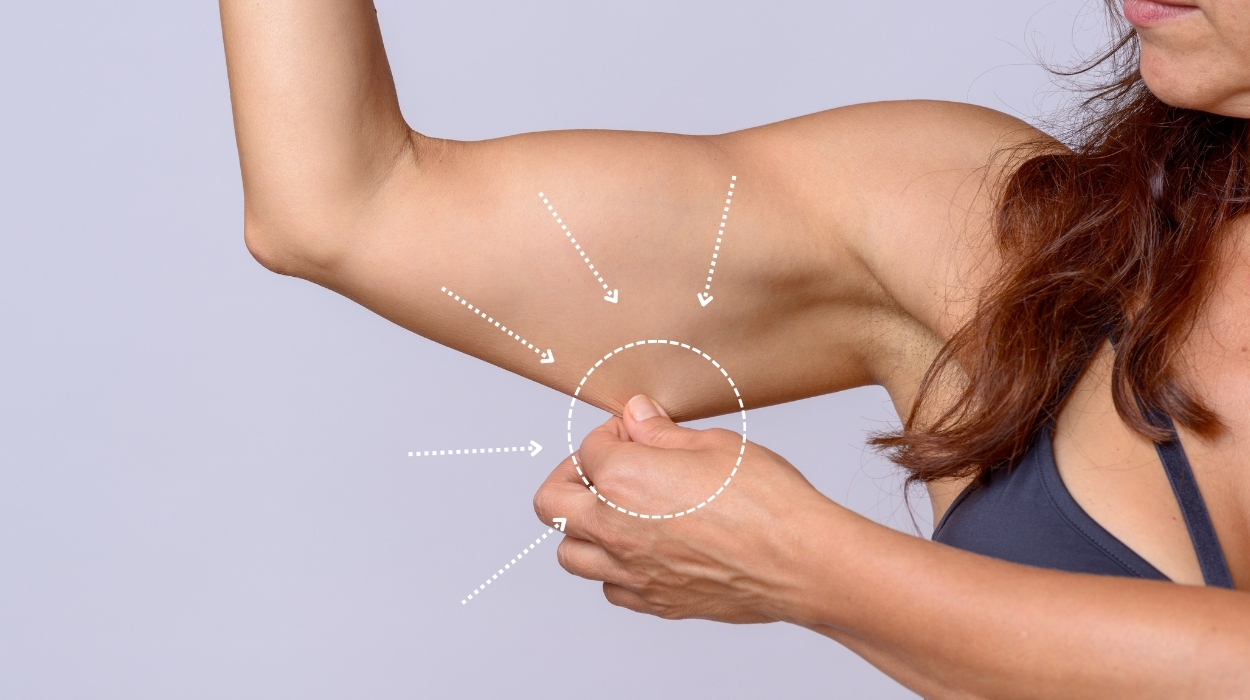We often only think of the positive effects that come from weight loss. Some of these health benefits include improved blood pressure levels, lower cholesterol, and improved mood.[1]
Unfortunately, loose excess skin can be an unwanted side effect of significant weight loss. While most people who lose weight don’t experience this, it’s linked to obesity[2] and massive weight loss, i.e., 100 pounds.
If you want to know how to avoid loose skin after weight loss, you’re in the right place. This article looks closer at ways to prevent the unwanted side effects of weight loss.
How To Not Have Loose Skin After Weight Loss?
- To avoid loose skin after weight loss, you should lose weight gradually, stay hydrated, eat a balanced diet, and engage in strength training exercises.
- Common causes of loose skin after weight loss include rapid weight loss and weight loss, such as over 100 pounds.
- Other essential factors to consider include aging, genetics, sun damage, and tobacco smoking.
How To Avoid Loose Skin After Weight Loss

The skin is the largest organ in the body and has multiple layers. It has many essential functions, such as protection and temperature regulation. Regarding saggy skin, two important proteins come into play: elastin and collagen.
Elastin is particularly important in helping the skin return to its original shape[3] after being stretched, such as after pregnancy. However, there are instances when excess skin is more challenging to avoid, such as after significant weight loss.
We’ve uncovered the five top ways to deal with this common problem. So, if you want to know how to prevent loose skin after weight loss, here are some of our expert tips:
Lose Weight Gradually
If you’re trying to lose weight, you may think it’s better to lose a lot at once. However, studies have shown this isn’t necessarily the best option. Body fat reduction is more effective in those who lose weight gradually[4] than those who follow a rapid weight loss plan.
You’re also more likely to avoid recurrent weight gain if you lose weight gradually.[5] Experts recommend losing around 1-2 pounds per week.[5] To lose weight, you must be in a calorie deficit of at least 500 calories per day.
Stay Hydrated

Water is the main component of your body’s cells and tissues. It’s estimated up to 75% of your body[5] is water. It’s no wonder staying hydrated is such a great way to support your skin health. While there is still limited research on how your water intake affects loose skin, studies have shown staying hydrated to be associated with healthier, more supple skin.[6]
How much water you should drink depends on your age, diet, and exercise routine. However, the general guidelines suggest drinking six to eight 8-ounce glasses of water daily.
If you find it challenging to reach your daily water intake goal, try adding fresh fruit and herbs to add natural flavor. A popular example is cucumber and mint water, which will leave you feeling refreshed and hydrated.
Eat A Balanced Diet
Research has proven poor nutrition[7] causes skin aging. Whole foods can protect[8] collagen and elastin fibers.
Whole foods are foods that do not have any preservatives and have been processed as minimally as possible. Examples include fresh fruits, vegetables, lean meats, eggs, whole grains, and legumes. Fiber-rich foods are essential to weight loss, and experts recommend getting around 25 grams of fiber per day.[9]
Adequate protein intake, including skin, is vital for maintaining regular tissue repair and renewal. The current Recommended Dietary Allowance[10] for protein is 0.8 grams per kilogram of body weight, regardless of age. However, many experts believe that is too low, recommending that healthy, active adults aim for at least 1.2 grams per kilogram of body weight.[11] This doesn’t account for factors like physical activity, where you may need slightly more protein – between 1.5-2.0 grams per kilogram.
Do you remember how we talked about the importance of collagen protein for your skin health? Aging can cause a loss of elastin fibers, resulting in sagging skin. Eating vitamin C-rich foods can increase natural[12] collagen production.
Also, oral collagen supplements can significantly increase[13] skin elasticity and moisture, which may help tighten loose skin. But it’s essential to remember supplements should be used in addition to a healthy diet, not as a replacement.
Exercise
Strength training is one of the best ways to increase lean body mass[14] and muscle mass. Engaging in exercise that involves lifting weights is the most common type of strength training.
Weight lifting helps you build strong muscles and lose fat without losing muscle mass, which can help tighten the skin. One of the other significant benefits of strength training[15] is that it helps increase your metabolic rate, which causes your body to continue to burn calories even after you finish your workout.
Another great exercise you can do is resistance training, specifically high-intensity workouts.[16]
Wear Sunscreen
There’s nothing better than a warm, glowy complexion after a day spent sunbathing by the sea. Unfortunately, the UV rays from the sun can be very harmful to your skin. Lack of sun protection results in premature aging,[17] such as wrinkles. It’s also linked to more serious health conditions,[17] like skin cancer.
When trying to find sunscreen, it’s recommended to use one with a sun protection factor – SPF – of at least 15 for it to be effective. While wearing sunscreen may not prevent loose skin after massive weight loss, it may help keep your skin elasticity supple.
What Causes Loose Skin After Weight Loss?
- Rapid Weight Loss: Losing weight too quickly has been linked[2] to loose skin.
- Weight Loss Amount: Losing too much weight too quickly may result in unwanted saggy skin. This is especially common after medical procedures to lose weight, i.e., bariatric surgery.[18]
- Collagen and Elastin Loss: The skin is weaker and less elastic after massive weight loss. This is due to damaged[19] collagen and elastic fiber networks.
How Much Weight Loss Causes Loose Skin?
The two most significant determinants of loose skin related to weight loss are how fast and how much weight you lose. Generally speaking, weight loss of 100 pounds or more in a relatively short period will likely result in loose skin.
Factors That Affect Loose Skin After Weight Loss
- Aging: It’s natural for your body to produce less collagen[17] as you age, which causes your skin to lose elasticity, resulting in loose skin.
- Genetics: Your genes may cause you to be more prone to faster skin aging[20] and loose skin.
- Sun Damage: We know there’s nothing better than feeling the warm sun against your skin after a long winter. But protecting your skin by wearing sunscreen is one of the best ways you can prevent damage to your skin from sun exposure.
- Smoking: Cigarette smoking increases a lot of the symptoms of aging, specifically wrinkles. Studies show cigarette smokers have much lower skin elasticity[21] compared to non-smokers.
Conclusion
Ultimately, loose skin from weight loss varies from person to person. Thankfully, there are several ways to lose weight without developing loose skin. When it comes to weight loss, one of the most important things to remember is to lose weight slowly.
Aim for a moderate weight loss rate of 1-2 pounds per week, as losing a lot of weight too quickly is one of the common causes of loose skin.
But it’s also essential to get enough hydration, eat a balanced diet focusing on whole foods, engage in strength training to prevent muscle mass loss, and wear sunscreen. Collagen supplements may also help. All of these things can help prevent excess loose skin when losing weight. Many of these factors are simple lifestyle changes.
Other factors to consider are your age, genetics, and whether or not you smoke tobacco. By following these measures, you’re more likely to avoid having to deal with excess loose skin after losing weight while still being able to reach your weight loss goal.
Frequently Asked Questions
Aim to lose 1-2 pounds per week, as rapid weight loss[2] is one of the leading causes of loose skin.
It depends on how much weight you lose and whether there is weight gain and then re-loss. A significant weight loss of over 100 pounds is associated with a higher prevalence of loose skin, such as after bariatric surgery.[18]
It is possible, but this is more likely if you lose a large amount of weight (more than 100 pounds), such as after a tummy tuck.
It depends on how much weight you lose. The more weight you lose, the more likely you’ll have excess loose skin.
 Evidence Based
Evidence Based